#225 bce
Text
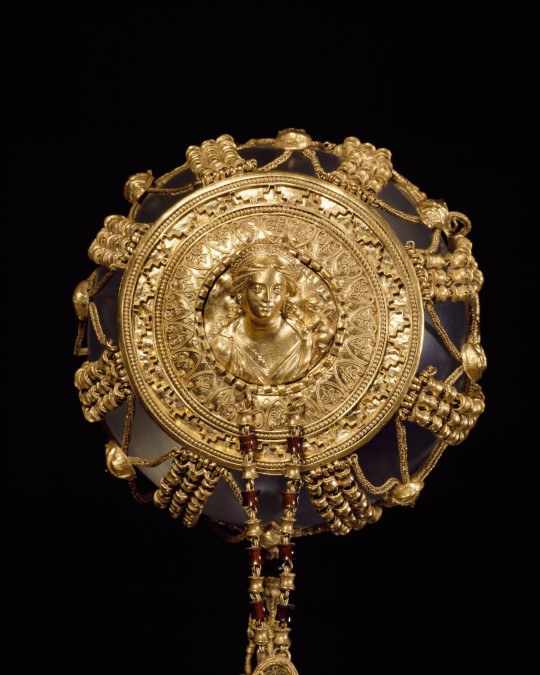
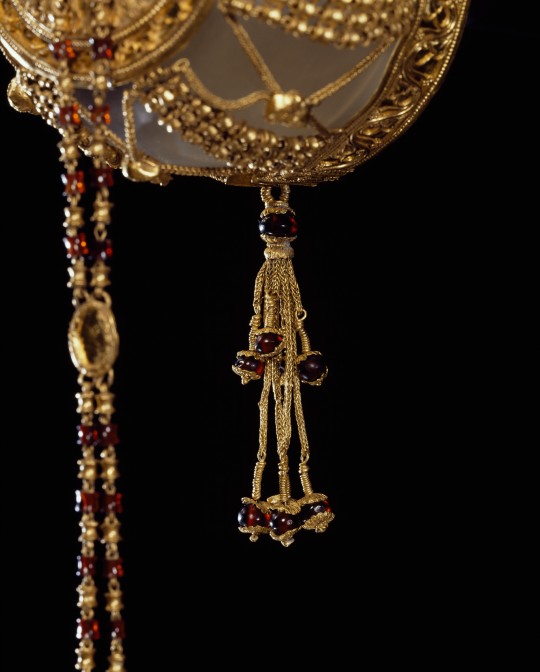
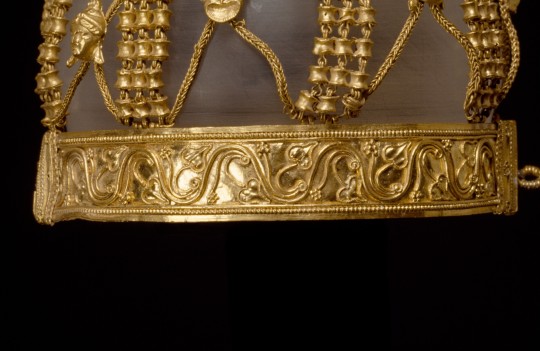
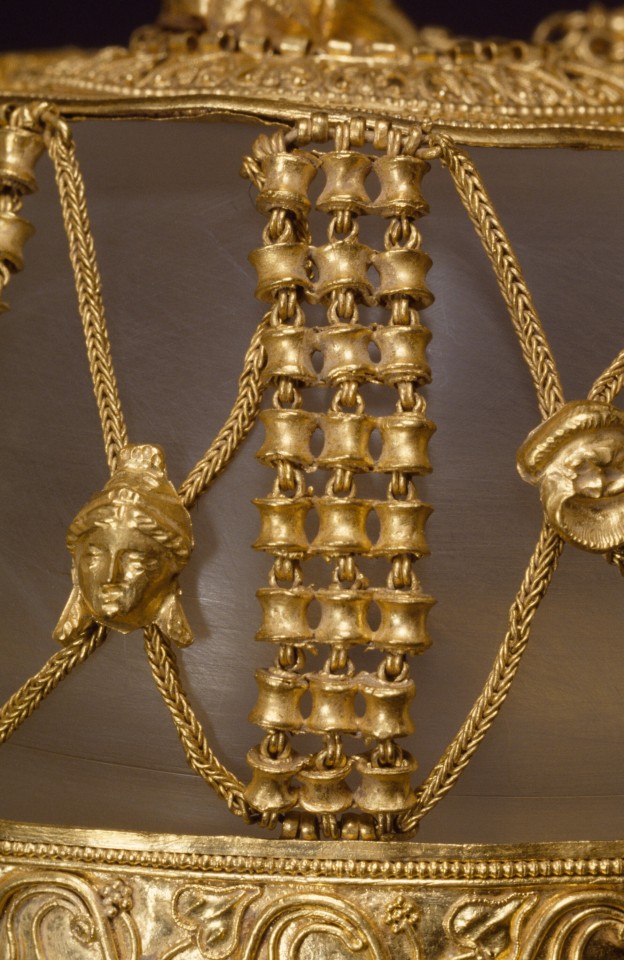
Gold hairnet, Ptolemaic, 225-175 BCE
From the Getty Villa Museum
#hairnet#gold#fashion#fashion history#accessory#history#225 bce#200s bce#175 bce#100s bce#bce#ancient#ptolemaic#ancient greek#ancient egyptian#greek#egyptian#ancient greece#ancient egypt
651 notes
·
View notes
Photo

Phocion
Phocion (c. 402 – 318 BCE) was an Athenian statesman and military commander who, according to tradition, was made a general a staggering 45 times. A student of Plato and known as 'the Good', his political position was somewhat ambiguous, and ultimately he was accused of colluding with the Macedonians and dismantling the democracy of Athens. He is the subject of one of Plutarch's Lives biographies.
Early Life & Career
Phocion (also spelt Phokion) was born in the deme of Potamioi; his father was Phokos. Not much is known of his early life except that he studied at Plato's Academy and became a follower of the great philosopher. Amongst his friends he counted the philosopher Xenocrates and the noted general Chabrias. This distinguished company may explain Phocion's reputation as a highly principled and conservative member of the Athenian elite and his popular title of 'Phocion the Good' (ho chrestos). He was also famous for his austere lifestyle, and he once sent his son Phocus to Sparta so that he might benefit from their less ostentatious lifestyle compared to the aristocracy of Athens.
Phocion consistently opposed the policies of his contemporary, the famed orator Demosthenes and preferred a more pacifist policy towards the increasingly threatening Macedon. Plutarch informs us that he never sought office but accepted his duty when he was called upon. The same could be said for his policies – he would often speak his mind but bend to the decision of the government. As Plutarch quotes him, "you can make me act against my wishes, but you shall never make me speak against my judgement" (225).
According to Plutarch, Phocion fought with distinction at the sea battle off rebellious Naxos in 376 BCE. His first military role, collaborated by other sources, was in 349 BCE when he was general (strategos) for the campaign in Euboea. This was followed by action on Cyprus, although perhaps not as a commander. Plutarch also notes in his biography that it should be remembered that by the time Phocion gained a position of power and influence, whatever he may have been accused of in his later career, the ship of state was already a wreck. Athens found itself in a period of long decline from which it would never manage to extract itself.
Continue reading...
24 notes
·
View notes
Text
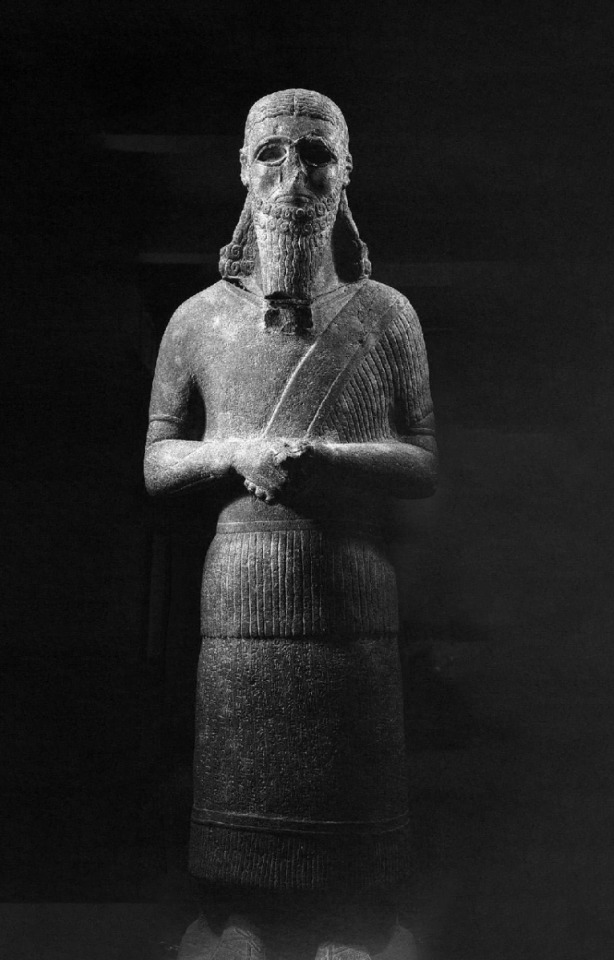
Statue of Aramean King Hadad-Adyisi of Gozana
Sikan (Tell Fakhariyeh, Syria)
c. 850 CE
Current location: National Museum of Damascus
Source: Syrie. Mémoire et Civilisation. Institut du Monde Arabe, Paris, Flammarion, 1993, p. 260, n o 225.
"In northeastern Syria in 1979, a farmer discovered a life-size basalt statue while he was plowing his field near Tell Fakhariyeh, ancient Sikan, on the shores of the Habur River. It was identified as a statue of the governor of Gozan named Had-Yith’i. There is a bilingual inscription in Akkadian and Aramaic. On the front of his skirt are 38 lines of Assyrian cuneiform, and on his back are 23 lines of alphabetic Aramaic. The Aramaic script has a surprisingly archaic appearance, but the artistic style and the appearance of the cuneiform signs, date to about mid-ninth century BCE. The writing presents the oldest known Aramaic inscription of substantial length. It also shows the Assyrian domination of the Habur Valley in this period. The text commemorates the installation of the statue of Had-Yith’i in the temple of the god Hadad of Sikan.
The dedication is presented twice, in both the Akkadian and Aramaic versions. In the Aramaic text, the first dedication reads:
The statue which Had-Yith’i set up before Hadad of Sikan, the canal-supervisor of heaven and earth, who showers abundance, and who gives pasture and watering places to all the lands, and who gives portions and offerings ‘to all the gods, his brothers; the supervisor of all the rivers, who provides for all the lands; the compassionate god whose prayer is good, [and] who dwells in Sikan, the great lord, the lord of Had-Yith’i, king of Gozan of Sassnuri, king of Gozan for the preservation of his life, for the lengthening of his days, for the abundance of his years, for the well-being of his house, for the well being of his offspring, for the well-being of his people, and for removing sickness from him, hearing his prayer and accepting of the utterance of his mouth, [Had-of Sikan]." - Source
57 notes
·
View notes
Text
trial of Gaius Cornelius
date: 65 BCE
charge: lex Cornelia de maiestate (illegal actions as tr. pl. 67)
defendant: C. Cornelius tr. pl. 67
advocate: M. Tullius Cicero cos. 63 (Sch. 76-77)
prosecutors: C. (or L.?) Cominius of Spoletium (subscr.) (ORF 143/144.II)
P. Cominius of Spoletium(nom. del.) (ORF 143/144.II)
praetor: Q. Gallius
witnesses: Mam. Aemilius Lepidus Livianuscos. 77, princeps sen.? 70, cens.? 64
Q. Caecilius Metellus Pius cos. 80
Q. Hortensius Hortalus cos. 69 (ORF 92.XII)
Q. Lutatius Catulus cos. 78, cens. 65 (ORF 96.V)
P. Servilius Globulus tr. pl. 67
M. Terentius Varro Lucullus cos. 734 (ORF 91.II)
other: two actiones, four days of defense
Cic. Orat. 225; V. Max. 8.5.4; Asc. 57-81C; Quint. Inst. 5.13.18, 6.5.10, 8.3.3, 10.5.13; Plin. Ep. 1.20.8; see also Cic. Brut. 271
10 notes
·
View notes
Text
Tier 2 Recap
256. 254. Andrew Ryan from Buoshck
255. 216. Nyssa õf Traken from Doctor who
254. 228. Asha from Iji
253. 22. Whisper Schnee from Boldores and Boomsticks
252. 253. Chuuya Nakahara from Bungou stray dogs
251. 18. Mapleshade from warrior cats
250. 190. Andrew Eldritch from real life
249. 120. sans undertale from undertale
248. 219. T-Rex from Jurassic Park
247. 141. Karkat Vantas from Homestuck
246. 53. Rasputin IV from X-Men
245. 20. Hunter | The Golden Guard from The Owl House
244. 7. Kim Dokja from Omniscient Reader's Viewpoint
243. 50. Death from Darksiders
242. 266. Dave Miller from Dsaf
241. 174. Dr. Miranda Jones from Star Trek: The Original Series
240. 274. donquixote doflamingo from one piece
239. 92. Hyakunosuke Ogata from Golden Kamuy
238. 11. Kha'Nel from Dragens Øye
237. 139. George Costanza from Seinfeld
236. 121. Rampage from Beast Wars
235. 62. ε (epsilon) from Mathematics, real life (kinda? Not sure maths qualifies as real life) ) (common phrase: Let ε>0 be any real number)
234. 134. BoJack Horseman from BoJack Horseman
233. 291. Juleka Couffaine from Miraculous: Tales of Ladybug and Chat Noir
232. 129. Flavio Rezza (MC Flava) from real life
231. 215. Goodtimewithscar or Scar for short (the minecraft youtuber)
230. 186. Percy Weasley from Harry Potter
229. 170. claude frollo from the hunchback of notre dame (specifically the stage musical)
228. 217. Grian from Life Series (3rd/Last/Double/Limited Life)
227. 168. the submitter from real life
226. 269. Mizi from Alien Stage
225. 96. Robin Stuart from Arc of Infinity (Doctor Who)
224. 172. Tessa Minsky from Imogen, Obviously
223. 267. Ea-nasir (real life copper merchant - 1750 BCE)
222. 37. Kokichi Ouma from Danganronpa V3
221. 147. Rose Lavillant from Miraculous: Tales of Ladybug and Chat Noir
220. 135. Fiver from Watership down
219. 251. Keith Kogane from Voltron
218. 63. Cricket from Wings of Fire
217. 146. Adric of Alzarius from Doctor Who
216. 177. Mort from the Madagascar Movies/All Hail King Julian
215. 59. Edward Elric from Fullmetal metal alchemist
214. 290. Jimmy Solidarity from The Empires smp
213. 259. rayla from the dragon prince
212. 205. Starfy from The Legendary Starfy
211. 232. Taako from The Adventure Zone
210. 188. Hatsune Miku from Vocaloid
209/208. 182. Matt Murdock from Daredevil (Netflix)
209/208. 107. Ted Kord from DC comics
207. 86. Juleka Couffaine from Miraculous: Tales of Ladybug and Chat Noir
206. 27. Sailor Saturn from Sailor Moon
205. 197. Marc Anciel from Miraculous Ladybug
204. 159. Yona from Yona of the Dawn
203. 220. David Chiem from Danganronpa: Despair Time
202. 125. Tynan from Aurora Webcomic
201. 169. Kid Blink from Newsies
200. 128. π (pi) from Mathematics (as in half a circle of radius 1)
199. 275. Zee from Total Drama 2023
198. 278. Flynn Moore from Echo (the furry vn)
197. 270. Caim Tivh from Mørkalven
196. 195. Grendel, The Grimm General from Boldores and Boomsticks
195. 280. Hermie the Unworthy from Dungeons and Daddies
194. 181. Ebony Dark'ness Dementia Raven Way from My Immortal
193. 247. Monkey D Luffy from One Piece
4 notes
·
View notes
Text

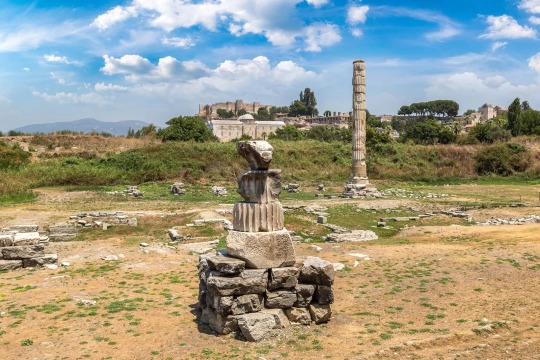


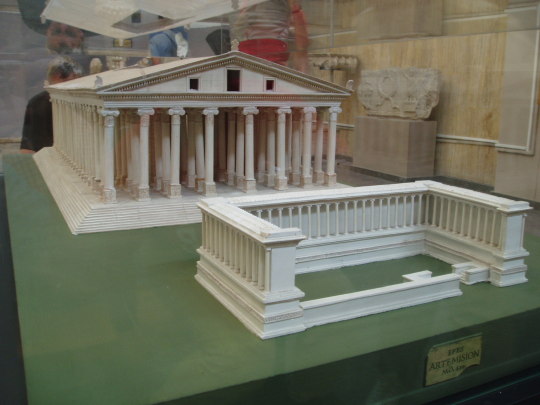

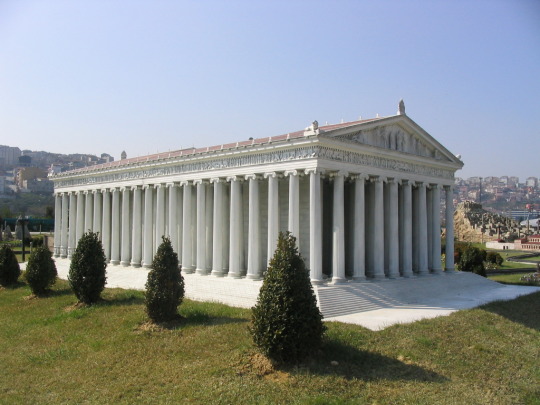


The Temple of Artemis at Ephesus 8th C. BCE.
"Those who first built temples to the Gods . . . Otrera, an Amazon, wife of Mars [Ares], first founded the temple of Diana [Artemis] at Ephesus."
-Hyginus, Fabulae 225
#artemis#ancient greece#antiquities#history#amazons#otrera#wonders of the world#literature#ares#pagan#paganism#temple#museums#asia minor
45 notes
·
View notes
Text
The Grace in Your Eyes
The Grace in Your Eyes
by LiraelClayr007
Crowley and Aziraphale run into each other in Ancient Greece. They're both taking a little time off, to enjoy the evening's entertainment, and decide they might as well sit together...
Words: 225, Chapters: 1/1, Language: English
Series: Part 29 of NaPoWriMo2023
Fandoms: Good Omens - Neil Gaiman & Terry Pratchett
Rating: General Audiences
Warnings: No Archive Warnings Apply
Categories: M/M
Characters: Aziraphale (Good Omens), Crowley (Good Omens)
Relationships: Aziraphale/Crowley (Good Omens)
Additional Tags: Mentioned Sappho (fl. 600 BCE), Chance Meetings, Ancient Greece, Fluff, Poetry
From https://ift.tt/s86GFE5
https://archiveofourown.org/works/46839829
3 notes
·
View notes
Text
Library of Circlaria: Remikra Timeline
Library of Circlaria
Most Recent: November 1333 to February 1344
Beginning: 1025 to 845 BCE
835 BCE
830 BCE
825 BCE
820 BCE
805 BCE
795 BCE
785 BCE
775 BCE
765 BCE
760 BCE
712 BCE
702 BCE
690 BCE
680 BCE
670 to 480 BCE
432 BCE
12 BCE
100 CE
112 CE
115 CE
123 CE
130 CE
131 CE
137 CE
217
225
241
245
251
267
271
302
308
312
317
323
341
394
492
499
522
532
533
535
536
667
680
703
714
729
775
777
817
859
894
946 to 952
953 to 982
985 to 991
991 to 997
998 to 1026
1027 to 1072
1073 to 1085
1086
1108
1149
1167
1194
1206
1236
March 1238
June 1238
November 1238
November 1239
January 1243
June 1243
February 1244
March 9, 1244
March 17, 1244
May 1244
January 1249
1264 to 1308
September 1309
January 1311
1312 to 1319
November 1319
September 1321
May 1323 to April 1329
May 1329 to December 1332
November 1333 to February 1344
1 note
·
View note
Text
In the ruins of northern China in the 380s the Xianbei set up their own state, called Northern Wei.*
*Once again, the terminology is confusing. The Xianbei borrowed their name from the ancient kingdom of Wei (445-225 BCE) mentioned in Chapter 5. To distinguish the Xianbei state from the earlier kingdom, some historians call it Tuoba Wei (named after the Xianbei clan that ran the state); others prefer Northern Wei, the usage I follow here.
"Why the West Rules – For Now: The patterns of history and what they reveal about the future" - Ian Morris
#book quotes#why the west rules – for now#ian morris#nonfiction#ruins#northern china#4th century#xianbei#northern wei#tuoba wei#chinese history
0 notes
Text
Ancient Greek Olympics (494 BCE)
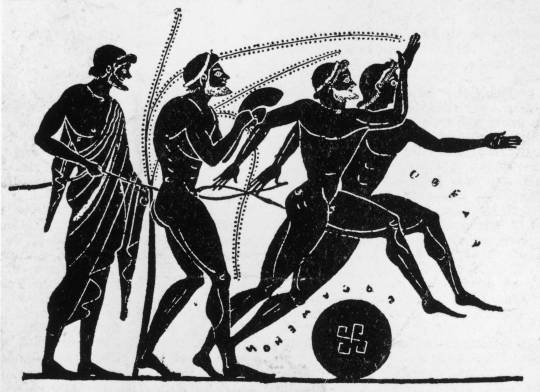
The Ancient Olympic Games were a meaningful athletics event usually held in ancient Olympia. For the Greeks, it was a ceremonial event with tradition for many centuries. Pausanias' "Descriptions of Greece," how he describes some practices and rules in the Games, can show you what the Greeks were like regarding gender and sex roles. For example, a mountain before you cross the Alpheus is called Mount Typaeum. According to Pausanias, it is a "law of Elis to cast down it any women who are caught present at the Olympic games…" (Pausanias). It does not surprise me, as women did not have much of a role in the government or anything in ancient Greek society.
Oh, yeah, I forgot to mention that while we were watching the speech from Aeschines, the tall, lanky man in the trench coat and the matrix-looking sunglasses gave me an option to either take a red or blue pill to get my time machine back (he told me he was the CEO of Time, which is why he allowed me to get my time machine back). So, of course, I chose the blue pill because blue was the same color as my time machine! (and no, I did not steal the Doctor Who machine). So I decided to go to the Ancient Olympic Games in 394 BCE to try and enjoy some games. Like "Western Society" does the Olympics, the Greeks held them every four years between August 6 and September 19.
While traveling to Olympia, it was a beautiful, warm sunny day near Olympia. The grass fields and farmers' markets full of vegetables and fruits attracted me to try Greece's favorite foods. I decided to stop by a market near a farm filled with numerous hunched-back people struggling to hoe the grass under the heat. They resembled slave behaviors, so I decided to speak to one of them after getting my vegetables.
After getting my vegetables, which were fresh asparagus, cardoons, celery, fennel, cabbage, and onions, I decided to walk over to one of the enslaved people and ask them a few questions. An enslaved person named Angelo told me about his experience in agricultural labor near Olympia and the different Greek city-states, as Olympia has not been his first stop. He told me about certain farming practices and keeping the crops healthy, but he could not ignore the work part. He told me there was a "point of considerable stress during the agrarian cycle" when the farmers came under pressure to collect, process, and store crops before harvesting season ended (McHugh 208). I thanked him for his input into life, as I already knew from research that most of the evidence of communal labor, especially amongst the farmers during the Classical period, was lacking mainly due to no evidence. Historians have yet to find no evidence because of various factors, including education, social structure, and class structure.
After meeting with the farmer and getting my vegetables, I headed to the Colosseum. However, the games shut down when I arrived, as the Romans took over and thought the event was "pagan." The Romans allowed the games to go on, but the activities and everyday events which made the Games destroyed the value of the cultural phenomenon. It was a travesty to see how the event went down. From talking to the farmer to seeing how the Romans treated the Games were all confirmation that Greece was slowly losing its civilization, and I was unsure how the society would survive for the following centuries.
Sources:
Internet History Sourcebooks. (n.d.). https://sourcebooks.fordham.edu/ancient/greekgames.asp
McHugh, M. (2019). To reap a rich harvest: experiencing agricultural labour in ancient Greece. World Archaeology, 51(2), 208–225. http://eznvcc.vccs.edu:2048/login?url=https://search.ebscohost.com/login.aspx?direct=true&db=a9h&AN=141659997&site=ehost-live&scope=site
(n.d.-b). The Academy Of Athens. Theoi Texts Library. Retrieved October 30, 2022, from https://www.theoi.com/Text/Pausanias1C.html
0 notes
Text
Ancient cloudwing mount to buy

ANCIENT CLOUDWING MOUNT TO BUY HOW TO
Once when he was staying with Tian Fen, the marquis of Wu'an, and was drinking with the marquis and his friends, he told one of the guests, an old man of over ninety, that he had gone with the man's grandfather to such and such a place to practise archery. 131 BCE), who was enfeoffed as the Marquis of Wu'an in 141 BCE. The former describes him at a party given by Empress Wang Zhi's half-brother Tian Fen (田蚡, d. The Shiji context continues with two "self-authenticating" (Campany 2009: 146) stories about Li Shaojunbeing able to recall incidents of the distant past (Loewe 2000: 227). Compare the 2nd-century BCE fangshi spiritualist mentioned below, Li Shaoweng (李少翁, Li the Youthful Old Man) (Campany 2002: 225). 151 BCE), the younger brother of Empress Dou. Li (李, plum) is a very common Chinese surname and Shaojun (少君, Youthful Lord) is a courtesy name-also used by Dou Shaojun (竇少君) or Dou Guangguo (竇廣國, d. Since Li intentionally kept his birthplace and age secret, little is certain about his life, even his name is a pseudonym: Li the Youthful Lord (Campany 2009: 117). Wu (物, thing, matter, phenomenon), interpreted as guiwu (鬼物, ghosts spirits divine beings), Some commentators and most translators take wu here to mean guiwu, ghosts and spirits, but we follow those who interpret it as yaowu, chemical substances and drugs. Despeux 2008:233).īurton Watson translates shiwu (使物) as " make the spirits serve him" and "command the spirits", interpreting wu (物, thing, matter, phenomenon) as guiwu (鬼物, ghosts spirits divine beings) Joseph Needham translates "using natural substances to bring about perpetual youth", interpreting wu as yaowu (藥物, medicines drugs) (1976: 29).
ANCIENT CLOUDWING MOUNT TO BUY HOW TO
carrying on alchemical practices), and knew how to live without (eating) cereals and without growing old" (Needham 1976: 29), and "method of worshipping the furnace and abstaining from cereals to prevent old age" (tr. Watson 1961: 25)Ĭompare alternate translations of "art of making offerings to the (spirit of the) Furnace (i.e. He relied wholly on his ability to work magic and was clever at making pronouncements that were later found to have been curiously apt. Impressed that he seemed to enjoy such affluence without engaging in any business, and also not knowing where he was from, people put even greater faith in his claims and vied with each other in waiting on him. When people heard of his power to command the spirits and drive away death they showered him with a constant stream of presents, so that he always had more than enough food and clothing and money. Claiming that he could make the spirits serve him and prevent old age, he travelled about to the courts of the various feudal lords, expounding his magic. He kept his real age and place of birth a secret, always telling people that he was seventy years old. Li Shaojun had formerly been a retainer of the marquis of Shenze and specialized in magical arts. The emperor treated him with great respect. It was at this time also that Li Shaojun appeared before the emperor to expound the worship of the god of the fireplace and explain his theories on how to achieve immortality through dietary restrictions. Li does not name which furnace gods to worship, but the Stove God Zaoshen is traditionally associated both with alchemy and bigu, in Chinese raw/cooked logic, since cereal grains were cooked on the stove. The Liji narrative about Li Shaojun begins with his intentionally obscure origins and introduction to Emperor Wu, to whom he recommends cizao (祠灶, sacrifice to the furnace/stove) and gudao (穀道, the Way of grains, aka bigu 辟穀, Daoist grain avoidance) as methods to attain longevity/immortality. Debaters were divided between two factions, the fangshi maintained that Wu should emulate the Yellow Emperor, their main deity, who obtained immortality through performing the rituals, while the Confucianist court officials such as Gongsun Hong suggested that the emperor should only express gratitude to Heaven and Earth (Pregadio 2006: 30). The Shiji chronicles Li Shaojun as part of a lengthy debate on whether and how Emperor Wu should perform the Feng (封) and Shan (禪) state rituals on Mount Tai in honor of Heaven and Earth. In the early history of Chinese waidan (External Alchemy), Li is the only fangshi whose role is documented by both historical (for instance, Shiji) and alchemical ( Baopuzi) sources. 133 BCE) was a fangshi (master of esoterica), reputed xian (transcendent immortal), retainer of Emperor Wu of Han, and the earliest known Chinese alchemist. Li Shaojun ( Chinese: 李少君 Wade–Giles: Li Shao-chün, fl. ( October 2020) ( Learn how and when to remove this template message) Parenthetical referencing has been deprecated convert to shortened footnotes. Please improve this article by correcting them. This article includes inline citations, but they are not properly formatted.

0 notes
Text
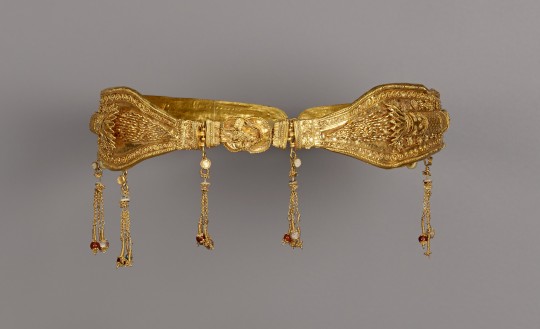
Diadem, Ptolemaic, 225-175 BCE
Gold, glass paste, bone or pearl, garnet, cornelian, and moonstone
From the Getty Villa Museum
#diadem#gold#fashion#fashion history#accessory#history#225 bce#200s bce#175 bce#100s bce#bce#ancient#ptolemaic#ancient greek#ancient egyptian#greek#egyptian#ancient greece#ancient egypt
427 notes
·
View notes
Photo

Philo of Byzantium's On the Seven Wonders
Philo of Byzantium's On the Seven Wonders (225 BCE) is the first known list of the Seven Wonders of the Ancient World (though it may have been based on earlier works now lost). Philo's list differs from the standard Seven Wonders in replacing the Lighthouse at Alexandria with the Walls of Babylon.
Continue reading...
24 notes
·
View notes
Text
i can’t believe that someone in 225 bce just went and put some sappho on a piece of broken pottery yes i know what ostraka are but they aren’t for keeping things they are for ephemeral texts and this person just wrote some sappho on one maybe even from memory and then we found it thousands of years later and sjfsbvfjsghdsjfgsjfjsjf im fuking cryign
#AAAAAAAAAAAAAAAA#they wrote it!!! with their little hands!!! on this little piece of clay and ohhhghghhg#im going to lose my MIND#ait#bones
22 notes
·
View notes
Text

Art collage of Art Nouveau interior by Emile Tassel with Bronze Greek Dancer statue (225-175 BCE) and Loise Fuller (ca. 1900)
#art nouveau#hellenism#lois fuller#femaleartist#collage#interiors#greek dance#modern dance#art history
12 notes
·
View notes
Text

Seleukos II Kallinikos, Tetradrachm, 246-225 BCE
"Antiochus, surnamed the Hawk, warred with his brother Seleucus for the kingdom. After Seleucus was overcome by the Galatians, and was not to be heard of, but supposed to be slain in the fight, he laid aside his purple and went into mourning. A while after, hearing his brother was safe, he sacrificed to the Gods for the good news, and caused the cities under his dominion to put on garlands."
-Plutarch: Sayings of kings and commanders, section 184
https://pagancurrencyvault.blogspot.com/2021/03/seleukos-ii-kallinikos-tetradrachm-246.html
#apollo#ancient greece#art history#ancient coins#seleucid#galatians#antioch#pagan#greek#drachma#ancient literature#kings#3rd century bce#plutarch#paganism
6 notes
·
View notes